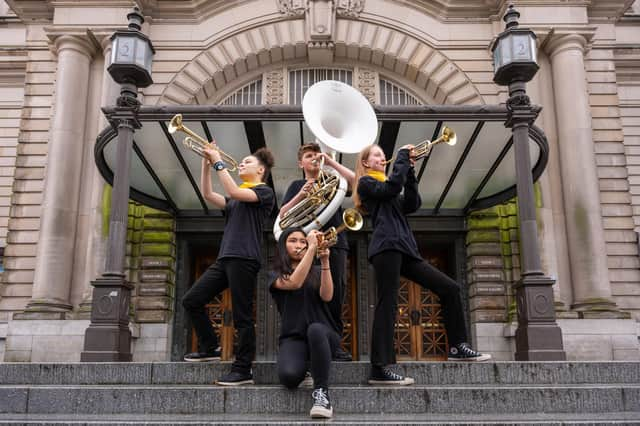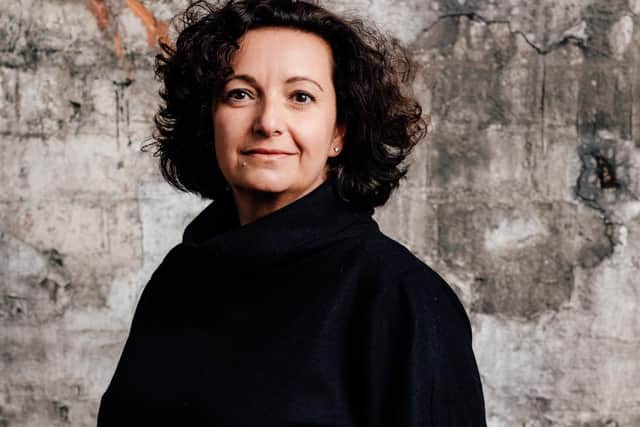Scottish culture sector faces 'house of cards' collapse, warns Edinburgh International Festival chief


The chief executive of the Edinburgh International Festival has warned Scottish culture is facing a “house of cards” collapse unless the Scottish Government delivers promised new funding for the arts within months.
Francesca Hegyi has suggested Scotland was at risk of losing “big chunks” of its cultural life without an urgent roll-out of the £100 million, which was pledged last year by the government, before crucial decisions on long-term public funding are taken in the autumn.
Advertisement
Hide AdAdvertisement
Hide AdShe urged the government to host a crisis summit on the future of arts funding in Scotland to set out a “delivery plan” for the promised new investment, suggesting there had been “complacency” about the scale of the financial problems faced by organisations.


She said collective action was needed to restore the confidence of the cultural sector, suggesting its “already fragile eco-system” had been significantly weakened by the targeting of festivals backed by investment firm Baillie Gifford, one of the EIF's main corporate backers.
The festival has pledged to keep working with the Edinburgh-based company, but has warned that it may have to look at changing its entire business model, charging more for tickets and even cutting the length of the event to try to balance its books after being left on “standstill” public funding since 2008 and
She compared the EIF to “a car that’s forever stuck in first gear” due to a lack of clarity on its public funding, which is said to have been at “standstill” levels since 2008 and worth around 50 per cent less.
The government insists the roll-out of the £100m, which it claims will “more than double” arts funding by 2028, is already well under way after Creative Scotland was allocated an additional £13.2 million in its most recent budget.


However Creative Scotland has pointed out that it is effectively on “standstill” funding after the restoration of controversial cuts imposed by the government in the middle of the last financial year.
The government has insisted that an additional £25 million is earmarked for culture in 2025-26, but it is unclear if Creative Scotland will be allocated its share before it is due to make decisions on applications for long-term funding in October.
Advertisement
Hide AdAdvertisement
Hide AdMs Hegyi said: “It’s a good thing that the £100m has been announced, but the government hasn’t started to deliver it yet.
"Words often don’t translate into action. You can have ambition, but that doesn’t necessarily mean delivery.
“I’d have expected to at least see a delivery plan by now, and to know when the £100m was coming, how it was coming, and how decisions were going to be made on how it was going to be dispersed.
"We need clarity on that £100m. All we have is an ‘aim’ to increase the overall culture budget by £25m in the next year, but at the moment it is just words. That’s a bit like me saying to my electricity provider that I’m 'aiming' to pay you a quarter of what the bill is. I’m not sure they’d be very happy about it.
"There is a credibility gap between the rhetoric, the strategies and the reality. Confident countries invest in culture. Without that, who are we?
"If we want to be a proud nation and stand alongside our European counterparts, who invest an average of 1.5 per cent of their budgets on arts and culture when we spend 0.5 per cent, we have to up our game.”
Creative Scotland warned in January that there was a risk of widespread collapse of parts of the culture sector if it was left on standstill funding when its long-term funding decisions are made in October
Advertisement
Hide AdAdvertisement
Hide AdIt is facing a funding gap of around £47.5m after applications were received from 281 different organisations, but may not receive a final budget settlement from the government until December.
Fears of the future of arts organisations have deepened in recent weeks after book festivals sponsored Baillie Gifford were threatened with boycotts and disruption by climate activists. The company has since parted company with literary events across the UK.
Culture secretary Angus Robertson has since said that disinvestment campaigns were “fundamentally undermining the arts sector”, ran the risk of “choking off recovery for many which were already in financial distress, adding: “People need to wake up to the existential threat to many of Scotland’s festivals and cultural organisations.”
Asked about the prospects for Scottish culture if Creative Scotland does not secure any additional funding before October, Ms Hegyi said: “It’s a house of cards at the moment.
"Ourselves and lots of people across the culture are relying upon a favourable outcome from the Creative Scotland multi-year funding decisions.
“If that £100m doesn’t come we are going to lose swathes of the cultural sector.
“We’ve got to be transparent about that. What I would love to see is some honesty, transparency and clarity, because they’ve all been missing so far.
Advertisement
Hide AdAdvertisement
Hide Ad"If there isn’t a favourable settlement for the sector in October we are going to lose big chunks of Scottish cultural life.
"I’ve spent the last week talking to people running arts organisations of various different sizes up and down Scotland.
“The consistent story they’ve been telling me is of decreased public funding, a loss of confidence in corporate sponsorship and philanthropy, and an absolute reliance on a positive outcome from the Creative Scotland multi-year funding process.
"I’m sure every arts organisation in Scotland is having the same very difficult conversations with their boards, on what happens if they don’t secure public funding, or even get standstill public funding.”
Ms Hegyi, who was appointed in 2018, said most of her time had been spent “figuring out how we keep the show on the road.”
She added: “We’d love to be speaking to international partners about growth, new ideas, innovation and all the things we’re raring to do.
“But we’re like a car that’s forever stuck in first gear because we have no visibility on our funding situation beyond a year.
Advertisement
Hide AdAdvertisement
Hide Ad“This festival is probably one of the most robust organisations in the sector. I’m confident that we’ll weather the storms because we’ve got fantastic donors, we’ve got really committed partners and members, and we will figure a way through.
“But it may mean that we will have to change our business model, look at reducing scope, look at reducing the length of the festival, and look at just doing things in a different way.
“We’ve had to introduce a charge for tickets for our opening event. I don’t want to have to do that but unfortunately we just can’t afford to make them free any more.
“The number of levers available to us are decreasing. We either do less with fewer people or charge more. There’s not much else outside of that.”
Mr Robertson was asked at Holyrood this week about the promised £100m roll-out and when Creative Scotland’s share would be allocated.
He said: “The government has already committed to a £15.8 million uplift in this financial year and to providing an additional £25 million next year. Discussions with Creative Scotland and the rest of the sector about additional financial support will continue.”
Both Mr Robertson and First Minister John Swinney have expressed concern about the impact of Baillie Gifford-backed events being targeted by climate activists in protest at its links with fossil fuel companies and Israel’s defence, tech and cybersecurity industries.
Advertisement
Hide AdAdvertisement
Hide AdMr Robertson said arts organisations faced “contagion” as a result of the disinvestment campaigns as they are now deterring other corporate backers and philanthropists, while Mr Swinney said the targeting of Baillie Gifford had been “misplaced,” adding that it was “jeopardising really important cultural festivals.”
Ms Hegyi said: “The wider issue is the future of support of the arts in Scotland.
“It’s much broader than just being about sponsorship or a particular company.
!We have been on standstill funding since 2008. It has reduced in its value by 50 per cent, but over the same period our costs have gone up by around 200 per cent. Those numbers just don’t add up.
"We’ve managed to bridge some of that gap through the relationships and support we’ve managed to secure from philanthropists, donors and corporate companies has been absolutely fundamental to us keeping the festival going. Around a third of our budget comes from those sources now.
“If there is one silver lining that has come out of the last few weeks it is that everybody is now talking about the fragility of the arts sector and the need to find some sort of sustainable funding model.
“I really welcome the comments that the First Minister and the cabinet secretary have made recently. They’ve been quite robust in their responses and it is now irrefutable that the issue of arts funding is on their agenda.
Advertisement
Hide AdAdvertisement
Hide Ad"It is a shame that it takes a crisis in order to galvanise people and mobilise.
“There is a real short-term need for the government to work to restore confidence, not just in the arts sector, but amongst the business community and amongst philanthropists. The people who have been supporting us want to know what the government's plan is.
“The longer term question is what the longer term model for the future of the arts in Scotland is.”
Comments
Want to join the conversation? Please or to comment on this article.
